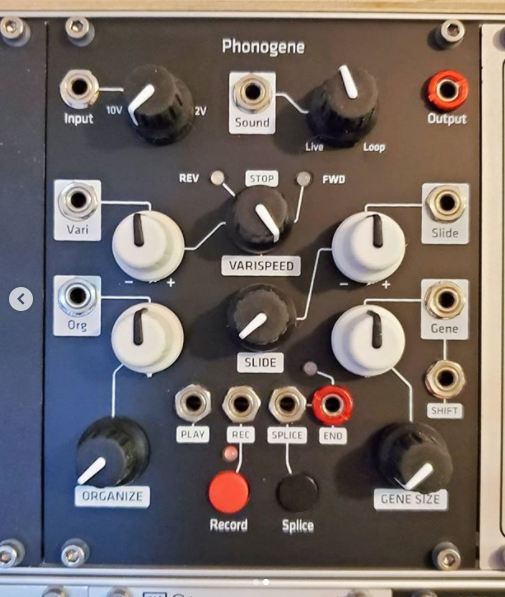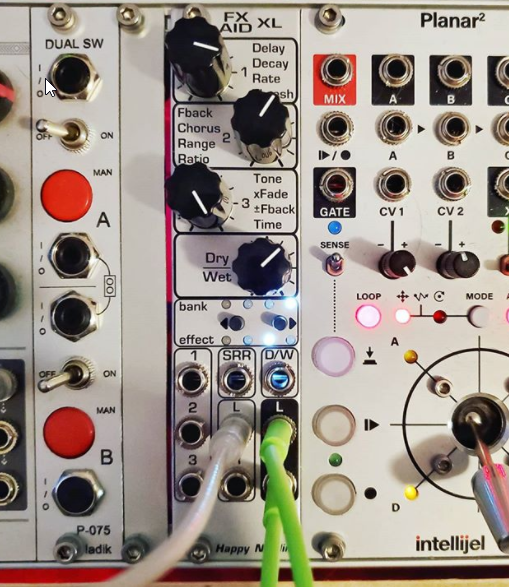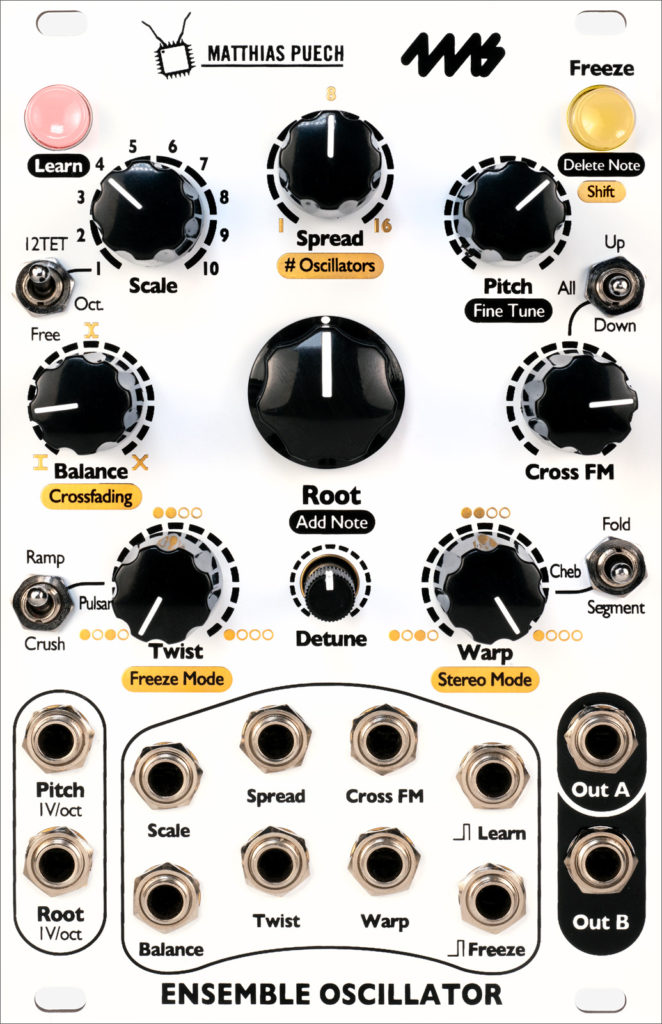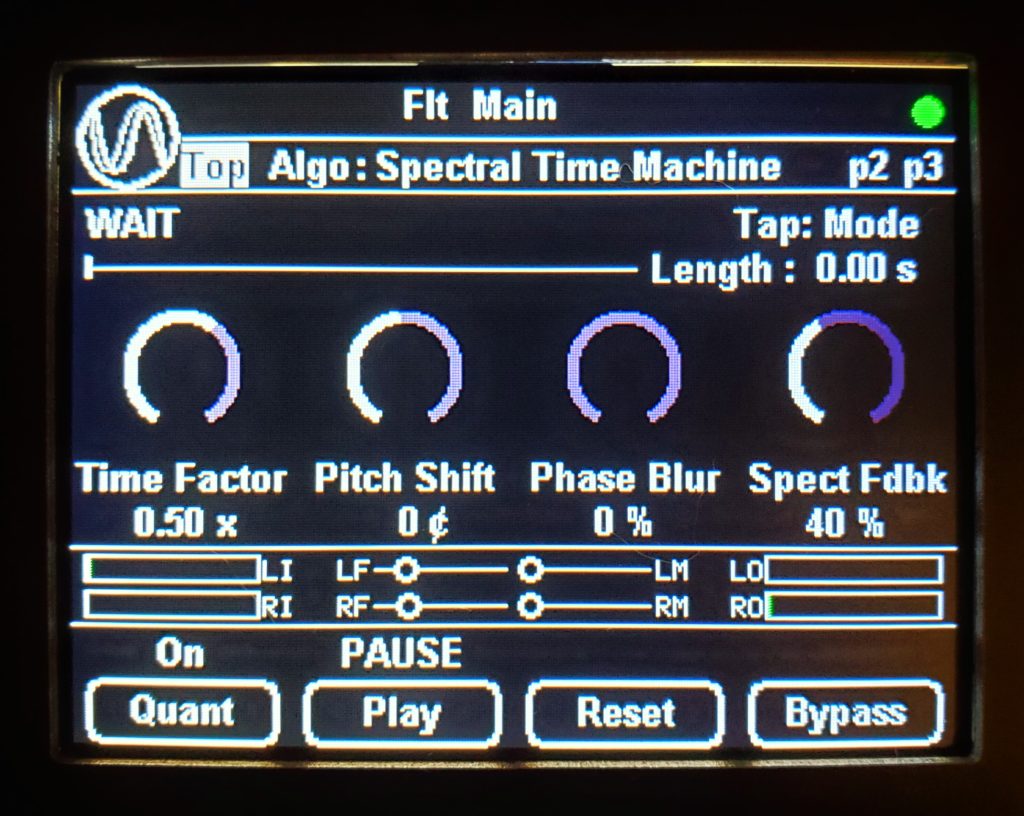The Synthesis Technology E520 Hyperion Effects Processor arrived Saturday. It is indeed a lovely and powerful piece of synthesis technology. As with every one of the brand’s modules, the build quality is really solid and sharp-looking. The LCD on this module is the brightest and has the best contrast of any I’ve seen on a piece of music gear (though this photo really doesn’t show it that well). More importantly, the interface is really smooth and easy to use, with very little shuttling around in menus (with the exception of one feature I will never need) and some of the things it can do to sound are nearly unbelievable.
The E520 has several different algorithms, with the possibility of more to come in future updates. I could (and started to) write up descriptions and mini-reviews of all of them, but that would be long, and probably boring to most people, and you could just look at this for the dry technical version.
So I will just say: there are a bunch of delays, each with unique features and character. Like the ability to change the sample rate of a delay while still staying locked to a tempo, or just shift the sample rate way down to make the delay darker and warmer. Or filters, pitch shifting, pattern-based delay, a “beat repeat” style delay, or a spectral delay that shifts different frequencies by different amounts of time.
There are some other time-domain effects, like a shimmer reverb, granular pitch shifter, sound-on-sound looper/recorder (with beautiful lo-fi tape degradation stuff you can dial in), frequency shifter, flanger with diffusion (which also doubles as a Karplus-Strong short delay), phaser, chorus, wah, etc. And there’s a “dual mono” mode which lets you select two simplified effects and chain them or run them independently.
There are some spectral effects which are kind of out of this world. If the module only had the Spectral Crusher algorithm, it’d still be formidable. Several years ago, I wrote some experimental VST plugins that manipulated sound in the frequency domain — but they were awkward, put a heavy burden on the CPU, and mostly just gimmicky. But Spectral Crusher does several of those in a way that is highly useful.
A normal (time-domain) filter reduces the strength of certain frequencies — for instance, a lowpass filter lets lower frequencies pass, while suppressing higher ones. (Filters generally also have side effects on phase, resonant peaks where they increase levels of some frequencies, and so on which are exploited musically.)
But imagine turning that sideways — filtering out frequencies based on their incoming strength. You could take the strongest bands in a signal and cut them off, letting other harmonics and noise through — and then since the fundamental was probably one of the strongest frequencies, maybe pitch shift the results down an octave. Or you could apply compressor logic to thousands of individual frequency bands. Or you can force the levels of individual bands to decay more slowly than normal, yielding a kind of reverb.
Honestly, as much awesome stuff as this one particular algorithm can do, I feel like there’s incredible potential for even more manipulation of this kind. Granted, a lot of it would probably just sound like mush — but it’s an area I think we will see explored more in the future.
Anyway, there are some other spectral effects — a “drone maker” that slowly samples and sustains bands with a slow fade, a delay with spectral pitch shifter, a delay that applies variations in delay time to different bands, and a “Spectral Time Machine” looper that reminds me of Red Panda Tensor but more (and smoother, since it’s spectral rather than granular). It records audio in the frequency domain, applies feedback effects to it, and lets you play it back and overdub at any speed — backwards, forwards, even completely motionless — with pitch shifting independent of the speed. It’s pretty magical, although apparently was a little underappreciated by the beta testers.
So, yes, it’s quite good. Worth the large amount of rack space it takes up — though honestly, I think for 95% of usage it could get away with half the knobs and jacks. It’s got that flexibility for the edge case situations though, and in modular, that can sometimes be a make-or-break issue.
What else in the Eurorack world? The Pod 60 has been sitting here waiting to be filled up. The Sweet 16 controller should arrive today, so I could move everything over — but I will wait a few days before setting everything up, because my custom snake cable is also shipping now. That way I can rewire the rack with my audio interface and PDU all in one go. I bought a used Shapeshifter and it should be on its way soon. So all this is coming together pretty quickly.
I tried a couple of other firmware options on my Starling Via. META strikes me as a mini-Plaits and mini-Zadar in one module — doing different things depending on mode and looping settings. Oscillator and drum synth; wavetable-based envelope and looping envelope; “sequencer” and looping sequencer (although really those are just “envelopes” with weirder data). I liked the oscillator and drum stuff, but I think I’d rather go with an actual Zadar for the fancy modulation source if I were so inclined, since its display and warping capabilities make it more intuitive.
I tried OSC3 next, and will stick with that for a while. Basic oscillator shapes plus phase modulation, but with two “side” oscillators that have unique detuning features. It has an output that signals the beating frequency between the oscillators, so you could synchronize other modulation to it; you can also synchronize the beating to an incoming clock, which gets pretty wild if you use varying rhythms. And it’s got a chord mode that sounds nicely thick in a chiptuney sort of way, which complements the Via platform’s VCAs and sample-and-hold for some wild AM drones. I’ve got faceplates for OSC3 and META incoming, so I can switch between thus (and the SCANNER and SYNC3 I’ve already got) without being confused about the interface.
I figure I am headed for a “version 4.0” of my modular, but I don’t quite know what that looks like specifically yet. It all comes down to how I feel about Shapeshifter in usage and sound. My rough prediction is this:
- I’ll probably like Shapeshifter very much in terms of sound and feel. It’ll probably be “grab and go” enough to replace the Hertz Donut.
- Shapeshifter’s design is primarily a complex oscillator, which happens to use wavetables — wavetables are a weaker feature in it. E352 is primarily a wavetable oscillator, which has other tricks (and TZFM was literally an afterthought). The way I use my E352 in general is that the unison, FM etc. are the primary feature and wavetable morphing is a secondary axis of modulation and variation — so therefore, chances are I will feel like Shifter can replace the E352 as well.
- Unless Shifter has a very specific FM character to it, I will probably decide — after stewing about it — to keep Akemie’s Castle for now. Yeah it’s big, yeah it’s power hungry, but nothing else I’ve heard in modular sounds like it, and it’s not just the chords or the quasi-harmonic-oscillator thing I do with it.
- And I’ll probably decide against filling the available space with a Verbos Harmonic Oscillator. It’s big, and pricey, and I’m kind of already using some similar techniques with Castle anyway.
- I could decide I do want another oscillator though — perhaps Rubicon (a top-notch analog oscillator that does TZFM and is praised for clarity) or Orgone Accumulator (a sort of generalist digital oscillator with some neat sounds) or Odessa. Or I might recognize that Shifter, Castle, Kermit, and whatever the Via is being today, and also the Angle Grinder when it’s not being a filter, are enough 🙂








